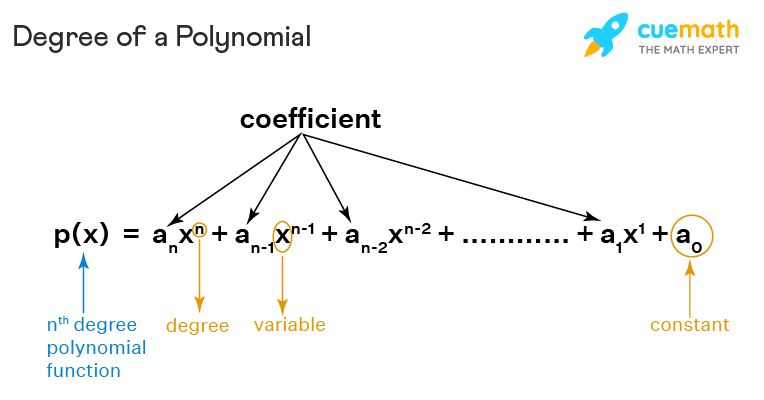how to find the degree of a polynomial
Degree of Polynomial
Polynomials are one of the significant concepts of mathematics, and so is the caste of polynomials, which determines the maximum number of solutions a function could take and the number of times a role volition cantankerous the 10-axis when graphed. Information technology is the highest exponential power in the polynomial equation. Let us larn in detail near this concept and how to find the degree of a polynomial.
| 1. | What is Caste of a Polynomial? |
| two. | How to Observe the Degree of a Polynomial? |
| three. | Polynomials Based on Degree |
| 4. | Degree of a Polynomial Applications |
| 5. | FAQs on Degree of a Polynomial |
What is Degree of Polynomial?
The degree of a polynomial is the highest exponential power in the polynomial equation. Merely variables are considered to bank check for the degree of any polynomial, coefficients are to be ignored. For an nth degree polynomial function with real coefficients and x as the variable having the highest ability n, where n takes whole number values, the degree of a polynomial in standard grade is given every bit p (x) = antenn + an-1tenn-1 + an-2xn-2 + ... + a1x1 + a0.
Degree of a Polynomial Definition:
The caste of a polynomial is the greatest power of a variable in the polynomial equation. To make up one's mind the caste of a polynomial function, simply the terms with variables are considered to observe out the degree of polynomial. The highest exponential power of the variable term in the polynomial indicates the degree of that polynomial.
Look at the polynomial function given below, where the highest power of x is n. Hence, n is the degree of polynomial in this function.

How to Find the Caste of Polynomial?
Consider the polynomial: p(ten): 2x5−12x3+3x−π. The term with the highest power of x is 2x5 and the corresponding (highest) exponent is five. Therefore, we volition say that the degree of this polynomial is v. Thus, the degree of a polynomial is the highest power of the variable in the polynomial. We tin correspond the degree of a polynomial by Deg(p(x)). Given below are some examples:
- Deg(xiii+1) = 3
- Deg(i+x+xtwo+xthree+...+xl) = 50
- Deg(10+π3) = 1
Note that the degree is the highest exponent of the variable term, so even though the exponent of π is 3 (refer to the last example given higher up), that is irrelevant to make up one's mind the degree of the polynomial.
Degree of a Zero Polynomial
When all the coefficients are equal to goose egg, the polynomial is considered to exist a nothing polynomial. And so, the caste of the zero polynomial is either undefined or defined in a way that is negative (-1 or ∞).
Degree of a Abiding Polynomial
A constant polynomial (P(10) = c) has no variables. Since there is no variable, there is no power to it. Thus, the degree of the constant polynomial is goose egg. For example: For half dozen or 6x0, degree = 0.
Degree of a Polynomial With More 1 Variable
The degree of a polynomial with more than than one variable tin exist calculated by adding the exponents of each variable in it. For example: 5x3 + 6xiiy2 + 2xy.
- 5xiii has a degree of three (x has an exponent of 3).
- 6x2ytwo has a caste of iv (x has an exponent of 2, y has 2, so two+2=four).
- 2xy has a degree of 2 (x has an exponent of 1, y has 1, so ane+1=two).
The largest caste out of those is four, so the polynomial has a degree of 4.
Polynomials Based on Caste
Each of the polynomials has a specific caste and based on that they accept been assigned a specific name. Let's allocate the polynomials based on the degree of polynomial with examples.
| Polynomials | Caste | Examples |
|---|---|---|
| Abiding Polynomial | Polynomials with Degree 0 | iii |
| Linear Polynomial | Polynomials with Degree one | x + eight |
| Quadratic Polynomial | Polynomials with Degree 2 | 3xtwo - 4x + seven |
| Cubic Polynomial | Polynomials with Degree iii | 2x3 + 3x2 + 4x + six |
| Quartic Polynomial | Polynomials with Degree iv | xiv-xvi |
| Quintic Polynomial | Polynomials with Degree five | 4xfive+ 2x3 - xx |
Caste of a Polynomial Applications
Given below are a few applications of the degree of a polynomial:
- To determine the maximum number of solutions that a office could have.
- To determine the maximum number of times a function will cantankerous the ten-axis when graphed.
- To check whether the polynomial expression is homogeneous, determine the caste of each term. When the degrees of the term are equal, so the polynomial expression is homogeneous and when the degrees are not equal, then the expression is said to be non-homogenous. For example, in 4x3 + 3xy2+8y3, the degree of all the terms is three. Hence, the given example is a homogeneous polynomial of degree 3.
Degree of Polynomial Tips and Tricks:
In social club to find the degree of a polynomial, you lot tin follow these steps:
- Identify each term of the given polynomial.
- Combine all the like terms, the variable terms; ignore constant terms.
- Accommodate those terms in descending gild of their powers.
- Find the term with the highest exponent and that defines the degree of the polynomial.
Important Notes:
- Degree of a polynomial with but one variable: The largest exponent of the variable in the polynomial (using Descartes' rule of signs)
- Degree of a polynomial with more than than 1 variable: Add together the exponents of each variable given in a term, and find which term has the greatest caste. That will exist considered every bit the degree of the polynomial.
- Degree of a rational expression: Accept the caste of the top (numerator) and decrease the degree of the bottom (denominator).
- The degree of any polynomial expression with a square root such as 3√10 is 1/2.
Related Articles
Cheque these interesting articles related to the concept of the degree of polynomials in math.
- nth Caste Polynomial
- Types of Polynomials
- Polynomials in I Variable
- Polynomial Degree Calculator
Caste of Polynomial Examples
go to slidego to slidego to slide

Breakup tough concepts through unproblematic visuals.
Math will no longer be a tough field of study, especially when you sympathise the concepts through visualizations.
Volume a Free Trial Grade
Practice Questions on Degree of a Polynomial
go to slidego to slide
FAQs on Degree of a Polynomial
What is the Degree of a Polynomial?
The degree of a polynomial is the highest caste of the variable term with a non-nil coefficient in the polynomial.
What is the Degree of a Quadratic Polynomial?
Quadratic polynomials are characterized as polynomials with degree ii. Thus, the degree of a quadratic polynomial is 2.
What is Caste 3 Polynomial?
Degree 3 polynomials are known as cubic polynomials. They have 3 as the highest exponent of the variable. 1 example of a degree of the polynomial three is x3 + 5x - 20.
What is the Degree of the Zip Polynomial?
A zip polynomial has all its variable coefficients equal to zero. Information technology is a constant polynomial having a value of 0. Thus, the degree of the null polynomial is undefined.
What is the Caste of Polynomial v√10?
For the polynomial five√x, the exponent with variable x is 1/two. Thus, the degree of polynomial v√x is 1/ii.
What is the Degree of the Polynomial five√3?
The degree of polynomial 5√3 is nothing as at that place is no variable and the degree of any polynomial is defined by the highest exponential power of its variable term.
Why is the Caste of a Polynomial Important?
The caste of a polynomial function has peachy importance as it determines the maximum number of solutions that a role could have and the maximum number of times a function crosses the ten-axis on graphing it.
Source: https://www.cuemath.com/algebra/degree-of-a-polynomial/
Posted by: gillespieextesed.blogspot.com

0 Response to "how to find the degree of a polynomial"
Post a Comment